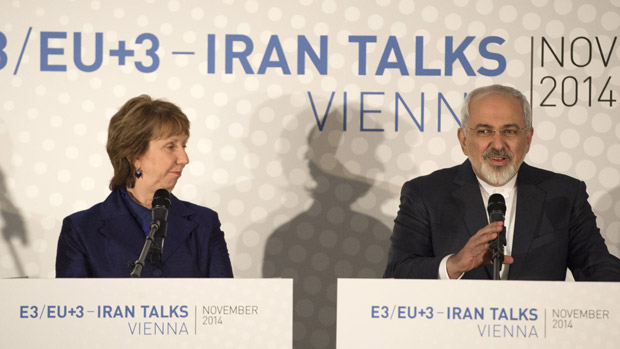Iran nuclear talks: extension 'better than the alternative'
Leaders 'disappointed but optimistic' after nuclear negotiations are extended once again

A free daily email with the biggest news stories of the day – and the best features from TheWeek.com
You are now subscribed
Your newsletter sign-up was successful
World leaders have extended talks on Iran's nuclear programme after failing to a reach a deal in Vienna, but representatives from the US, EU and Iran remained confident that a political agreement will eventually be achieved.
The year-long negotiations between Iran and six world powers – the US, the UK, France, Germany, China and Russia – had been expected to reach their conclusion yesterday but have instead been extended by seven months.
The talks, aimed at limiting Iran's nuclear capabilities in return for a lifting of sanctions, have already been extended once. Despite the delays, analysts say that an extension is preferable to a complete breakdown in negotiations, which would have global consequences.
The Week
Escape your echo chamber. Get the facts behind the news, plus analysis from multiple perspectives.

Sign up for The Week's Free Newsletters
From our morning news briefing to a weekly Good News Newsletter, get the best of The Week delivered directly to your inbox.
From our morning news briefing to a weekly Good News Newsletter, get the best of The Week delivered directly to your inbox.
The latest deadline for a political agreement has been set for March 1, while the final details will be released by July 1.
A joint statement from EU envoy Catherine Ashton and Iranian foreign minister Mohammed Javad Zarif said that all parties were confident a "comprehensive solution can be reached" by that point.
"We intend to build on the current momentum in order to complete these negotiations within the shortest possible time," they said.
UK foreign secretary Philip Hammond said the failure to reach an agreement by the deadline was "a disappointment", but said leaders needed to "recognise the reality" that a mutually acceptable deal would take longer than previously thought.
A free daily email with the biggest news stories of the day – and the best features from TheWeek.com
Iran's president Hassan Rouhani said that the gap between Iran and the West had "narrowed" over the last year.
US secretary of State John Kerry, however, was more cautious. He said significant progress has been made but warned that "some significant points of disagreement" still remain, the BBC reports.
"These talks are not going to get easier just because we extend them. They are tough. They have been tough and they are going to stay tough," he told journalists in Vienna.
The sticking points that prevented the deal have not been made clear, but the BBC suggests that they may involve the size and scope of uranium enrichment Iran will be allowed to develop and how quickly sanctions are lifted in response.
Israeli president Benjamin Netanyahu, who is strongly opposed to Iran acquiring nuclear weapons, said he was happy with the extension. "No deal is better than a bad deal," he said.
"It's important that they're continuing negotiations to reach an agreement," Trita Parsi, the president of the Washington-based National Iranian American Council, told Al Jazeera. "But there is big disappointment at missing the deadline, and the environment will be more doubtful [and] unforgiving in both Washington and Tehran," he warned.
-
 Political cartoons for February 21
Political cartoons for February 21Cartoons Saturday’s political cartoons include consequences, secrets, and more
-
 Crisis in Cuba: a ‘golden opportunity’ for Washington?
Crisis in Cuba: a ‘golden opportunity’ for Washington?Talking Point The Trump administration is applying the pressure, and with Latin America swinging to the right, Havana is becoming more ‘politically isolated’
-
 5 thoroughly redacted cartoons about Pam Bondi protecting predators
5 thoroughly redacted cartoons about Pam Bondi protecting predatorsCartoons Artists take on the real victim, types of protection, and more
-
 Epstein files topple law CEO, roil UK government
Epstein files topple law CEO, roil UK governmentSpeed Read Peter Mandelson, Britain’s former ambassador to the US, is caught up in the scandal
-
 Iran and US prepare to meet after skirmishes
Iran and US prepare to meet after skirmishesSpeed Read The incident comes amid heightened tensions in the Middle East
-
 Israel retrieves final hostage’s body from Gaza
Israel retrieves final hostage’s body from GazaSpeed Read The 24-year-old police officer was killed during the initial Hamas attack
-
 China’s Xi targets top general in growing purge
China’s Xi targets top general in growing purgeSpeed Read Zhang Youxia is being investigated over ‘grave violations’ of the law
-
 Panama and Canada are negotiating over a crucial copper mine
Panama and Canada are negotiating over a crucial copper mineIn the Spotlight Panama is set to make a final decision on the mine this summer
-
 Why Greenland’s natural resources are nearly impossible to mine
Why Greenland’s natural resources are nearly impossible to mineThe Explainer The country’s natural landscape makes the task extremely difficult
-
 Iran cuts internet as protests escalate
Iran cuts internet as protests escalateSpeed Reada Government buildings across the country have been set on fire
-
 US nabs ‘shadow’ tanker claimed by Russia
US nabs ‘shadow’ tanker claimed by RussiaSpeed Read The ship was one of two vessels seized by the US military